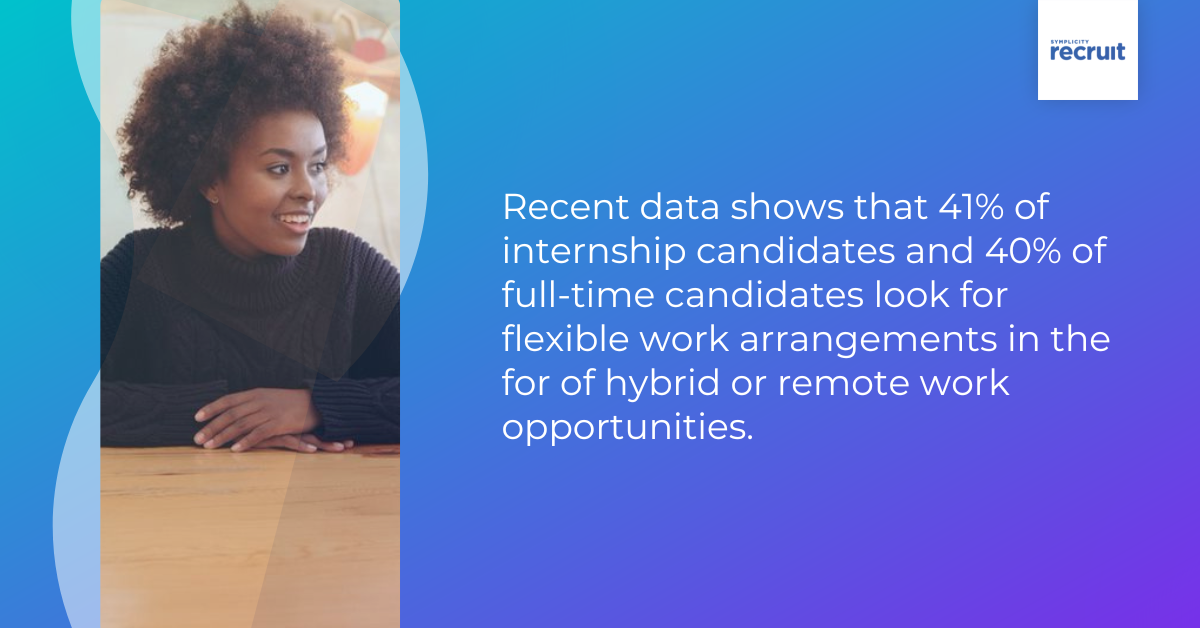As an employer competing with countless other organizations for top-tier entry-level talent, it is crucial to be aware of the types of benefits that appeal to this type of hire. Offering the right employee perks enables your organization to stand out as an employer of choice. Beyond offering a competitive base salary and work-life balance, there are myriad benefits that appeal specifically to new grads and increase your entry-level retention.
Here are the top perks a company should consider offering as part of your hiring strategy.
Salary and Work-Life Balance
Last fall, Symplicity Recruit conducted a student survey to gain a better understanding of the recruiting experience from a student’s perspective. Over 50% of students cited salary as one of the top benefits they look for throughout their job search, with work-life balance following close behind.
Gen Z is a generation that’s slowly redefining the work environment. While salary continues to stay on top as one of the most important benefits a candidate looks for, having enough room for a healthy work-life balance is a strong driver toward finding meaningful work opportunities.
Pro-Tip: Consider ways in which your company can promote work-life balance throughout the recruiting process. This will help sway strong candidates towards choosing you as a longtime employer over other companies.
Flexible Work Arrangements

Offering flexible hours and schedules to attract candidates can take many forms without negatively affecting productivity. Our own research from last year’s student survey showed that 78% of candidates look for flexible work arrangements in the form of hybrid and/or remote work. Of course, working remotely does not work for all jobs or all industries, but whenever feasible, it is worthwhile to consider.
Pro-Tip: Given the recent spike in the freelancer economy, following a hybrid/remote work model can help companies’ open positions compete with less structured opportunities that may be more attractive to entry-level candidates who desire the flexibility and freedom to work from accommodating environments.
PTO and Healthcare Insurance
A big part of improving your recruiting strategies on campus is understanding what Gen Z wants in a job. PTO and health insurance benefits are one of the most important benefits to candidates during a job search. This generation places importance on wellness, both physical and mental. In fact, 84% of internship and full-time candidates in our survey ranked substantial vacation and PTO as being very important or important throughout their job search, with 90% of full-time candidates and 84% of internship candidates ranking health insurance as a very important/important perk in their job search.
Pro-Tip: As this generation continues to put emphasis on their wellness and take an active role in their physical and mental well-being, employers need to make sure they are competitive with their basic benefits package before adding additional benefits into their offers.
Growth Opportunities
Recent college graduates want to know if they have growth opportunities in an organization. As part of a new graduate recruiting strategy, it is important to ensure the career progression for each role is clear and communicated to prospective candidates. Companies can offer shadowing opportunities to entry-level candidates to allow them to explore different career paths within the organization.
Other creative ways to give new hires exposure to career opportunities is through rotation programs where they work in and support different departments for specified periods of time. For example, every 4-6 months, the new grad would rotate to a new functional role. These rotation programs enable new grads to experience multiple career paths without ever leaving your organization.
Assess Employee Perks Currently Offered
Review your existing benefit offerings and determine if they are sufficient for entry-level candidates or if you need to supplement them with additional incentives. To confirm that your benefits are sufficient for entry-level candidates, consider the following:
- Consult with Career Centers - Talk to career advisors at campus career centers to learn about the benefits, perks, and incentives that are most attractive to their student body.
- Compare with competitors - Review the benefit offerings of competitors. These are often posted on company websites within their recruiting section to help attract candidates.
Competing for entry-level talent is tough, so it is important to understand what benefits are important to these candidates in order to attract them to your organization. The workforce continually changes as new generations graduate and become entry-level candidates. Staying on trend with what is important to each new graduating class from a total rewards perspective is crucial for a company to stay competitive in attracting the best and the brightest. Consider touting the employee perks your company offers on the job postings you create for student recruitment. Submitting these postings through a tool such as Symplicity Recruit ensures that a consistent message regarding the benefits you offer is shared seamlessly with all your target schools.